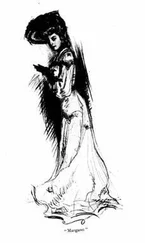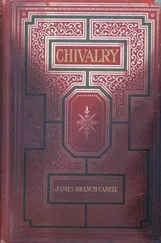James Cabell - The Rivet in Grandfather's Neck. A Comedy of Limitations
Здесь есть возможность читать онлайн «James Cabell - The Rivet in Grandfather's Neck. A Comedy of Limitations» весь текст электронной книги совершенно бесплатно (целиком полную версию без сокращений). В некоторых случаях можно слушать аудио, скачать через торрент в формате fb2 и присутствует краткое содержание. Жанр: Фэнтези, на английском языке. Описание произведения, (предисловие) а так же отзывы посетителей доступны на портале библиотеки ЛибКат.
- Название:The Rivet in Grandfather's Neck. A Comedy of Limitations
- Автор:
- Жанр:
- Год:неизвестен
- ISBN:нет данных
- Рейтинг книги:3 / 5. Голосов: 1
-
Избранное:Добавить в избранное
- Отзывы:
-
Ваша оценка:
- 60
- 1
- 2
- 3
- 4
- 5
The Rivet in Grandfather's Neck. A Comedy of Limitations: краткое содержание, описание и аннотация
Предлагаем к чтению аннотацию, описание, краткое содержание или предисловие (зависит от того, что написал сам автор книги «The Rivet in Grandfather's Neck. A Comedy of Limitations»). Если вы не нашли необходимую информацию о книге — напишите в комментариях, мы постараемся отыскать её.
The Rivet in Grandfather's Neck. A Comedy of Limitations — читать онлайн бесплатно полную книгу (весь текст) целиком
Ниже представлен текст книги, разбитый по страницам. Система сохранения места последней прочитанной страницы, позволяет с удобством читать онлайн бесплатно книгу «The Rivet in Grandfather's Neck. A Comedy of Limitations», без необходимости каждый раз заново искать на чём Вы остановились. Поставьте закладку, и сможете в любой момент перейти на страницу, на которой закончили чтение.
Интервал:
Закладка:
"Yes," he said. "Well, I shall not intrude."
"No—wait," she dissented.
Her voice was altered now, for there had come into it a marvelous gentleness.
And Colonel Musgrave remained motionless. The whole world was motionless, ineffably expectant, as it seemed to him.
Sunset was at hand. On one side was the high wooden fence which showed the boundary of Cedarwood, and through its palings and above it, was visible the broad, shallow river, comfortably colored, for the most part, like café au lait , but flecked with many patches of foam and flat iron-colored rocks and innumerable islets, some no bigger than a billiard-table, but with even the tiniest boasting a tree or two. On the other—westward—was a mounting vista of close-shaven turf, and many copings, like magnified geometrical problems, and a host of stunted growing things—with the staid verdancy of evergreens predominant—and a multitude of candid shafts and slabs and crosses and dwarfed lambs and meditant angels.
Some of these thronged memorials were tinged with violet, and others were a-glitter like silver, just as the ordered trees shaded them or no from the low sun. The disposition of all worldly affairs, the man dimly knew, was very anciently prearranged by an illimitable and, upon the whole, a kindly wisdom.
She was considering the change in him. Anne was recollecting that Colonel Musgrave had somewhat pointedly avoided her since her widowhood.
He seemed almost a stranger nowadays.
And she could not recognize in the man any resemblance to the boy whom she remembered—so long ago—excepting just his womanish mouth, which was as in the old time very full and red and sensitive. And, illogically enough, both this great change in him and this one feature that had never changed annoyed her equally.
She was also worried by his odd tone of flippancy. It jarred, it vaguely—for the phrase has no equivalent—"rubbed her the wrong way." Here at a martyr's tomb it was hideously out-of-place, and yet she did not see her way clear to rebuke. So she remained silent.
But Rudolph Musgrave was uncanny in some respects. For he said within the moment, "I am not a bit like John Charteris, am I?"
"No," she answered, quietly. It had been her actual thought.
Anne stayed a tiny while quite motionless. Her eyes saw nothing physical. It was the attitude, Colonel Musgrave reflected, of one who listens to a far-off music and, incommunicably, you knew that the music was of a martial sort. She was all in black, of course, very slim and pure and beautiful. The great cluster of red roses, loosely held, was like blood against the somber gown.
The widow of John Charteris, in fine, was a very different person from that Anne Willoughby whom Rudolph Musgrave had loved so long and long ago. This woman had tasted of tonic sorrows unknown to Rudolph Musgrave, and had got consolation too, somehow, in far half-credible uplands unvisited by him. But, he knew, she lived, and was so exquisite, mainly by virtue of that delusion which he, of all men, had preserved; Anne Charteris was of his creation, his masterpiece; and viewing her, he was aware of great reverence and joy.
Anne was happy. It was for that he had played.
But aloud, "I am envious," Rudolph Musgrave declared. "He is the single solitary man I ever knew whose widow was contented to be simply his relict for ever and ever, amen. For you will always be just the woman John Charteris loved, won't you? Yes, if you lived to be thirty-seven years older than Methuselah, and every genius and potentate in the world should come a-wooing in the meantime, it never would occur to you that you could possibly be anything, even to an insane person, except his relict. And he has been dead now all of three whole years! So I am envious, just as we ordinary mortals can't help being of you both; and—may I say it?—I am glad."
IV
They were standing thus when a boy of ten or eleven came unhurriedly into the "section." He assumed possession of Colonel Musgrave's hand as though the action were a matter of course.
"I got lost, Colonel Musgrave," the child composedly announced. "I walked ever so far, and the gate wasn't where we left it. And the roads kept turning and twisting so, it seemed I'd never get anywhere. I don't like being lost when it's getting dark and there's so many dead people 'round, do you?"
The colonel was moved to disapproval. "Young man, I suppose your poor deserted mother is looking for you everywhere, and has probably torn out every solitary strand of hair she possesses by this time."
"I reckon she is," the boy assented. The topic did not appear to be in his eyes of preëminent importance.
Then Anne Charteris said, "Harry," and her voice was such that Rudolph Musgrave wheeled with amazement in his face.
The boy had gone to her complaisantly, and she stood now with one hand on either of his shoulders, regarding him. Her lips were parted, but they did not move at all.
"You are Mrs. Pendomer's boy, aren't you?" said Anne Charteris, in a while. She had some difficulty in articulation.
"Yes'm," Harry assented, "and we come here 'most every Wednesday, and, please, ma'am, you're hurtin' me."
"I didn't mean to—dear," the woman added, painfully. "Don't interfere with me, Rudolph Musgrave! Your mother must be very fond of you, Harry. I had a little boy once. I was fond of him. He would have been eleven years old last February."
"Please, ma'am, I wasn't eleven till April, and I ain't tall for my age, but Tubby Parsons says——"
The woman gave an odd, unhuman sound. "Not until April!"
"Harry," said Colonel Musgrave then, "an enormous whale is coming down the river in precisely two minutes. Perhaps if you were to look through the palings of that fence you might see him. I don't suppose you would care to, though?"
And Harry strolled resignedly toward the fence. Harry Pendomer did not like this funny lady who had hurt, frightened eyes. He did not believe in the whale, of course, any more than he did in Santa Claus. But like most children, he patiently accepted the fact that grown people are unaccountable overlords appointed by some vast bêtise , whom, if only through prudential motives, it is preferable to humor.
V
Colonel Musgrave stood now upon the other side of John Charteris's grave—just in the spot that was reserved for her own occupancy some day.
"You are ill, Anne. You are not fit to be out. Go home."
"I had a little boy once," she said. "'But that's all past and gone, and good times and bad times and all times pass over.' There's an odd simple music in the sentence, isn't there? Yet I remember it chiefly because I used to read that book to him and he loved it. And it was my child that died. Why is this other child so like him?"
"Oh, then, that's it, is it?" said Rudolph Musgrave, as in relief. "Bless me, I suppose all these little shavers are pretty much alike. I can only tell Roger from the other boys by his red head. Humanity in the raw, you know. Still, it is no wonder it gave you a turn. You had much better go home, however, and not take any foolish risks, and put your feet in hot water, and rub cologne on your temples, and do all the other suitable things——"
"I remember now," she continued, without any apparent emotion, and as though he had not spoken. "When I came into the room you were saying that the child must be considered. You were both very angry, and I was alarmed—foolishly alarmed, perhaps. And my—and John Charteris said, 'Let him tell, then'—and you told me—"
"The truth, Anne."
"And he sat quietly by. Oh, if he'd had the grace, the common manliness—!" She shivered here. "But he never interrupted you. I—I was not looking at him. I was thinking how vile you were. And when you had ended, he said, 'My dear, I am sorry you should have been involved in this. But since you are, I think we can assure Rudolph that both of us will regard his confidence as sacred.' Then I remembered him, and thought how noble he was! And all those years that were so happy, hour by hour, he was letting you—meet his bills!" She seemed to wrench out the inadequate metaphor.
Читать дальшеИнтервал:
Закладка:
Похожие книги на «The Rivet in Grandfather's Neck. A Comedy of Limitations»
Представляем Вашему вниманию похожие книги на «The Rivet in Grandfather's Neck. A Comedy of Limitations» списком для выбора. Мы отобрали схожую по названию и смыслу литературу в надежде предоставить читателям больше вариантов отыскать новые, интересные, ещё непрочитанные произведения.
Обсуждение, отзывы о книге «The Rivet in Grandfather's Neck. A Comedy of Limitations» и просто собственные мнения читателей. Оставьте ваши комментарии, напишите, что Вы думаете о произведении, его смысле или главных героях. Укажите что конкретно понравилось, а что нет, и почему Вы так считаете.



